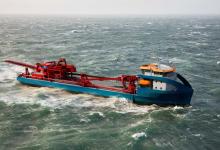Hanson UK is acquiring two new 3,000 cubic metre capacity trailing suction hopper dredgers for its marine aggregate fleet.
[caption id="attachment_80200" align="alignleft" width="399"] Hanson UK is acquiring two new 3,000 cubic metre capacity trailing suction hopper dredgers for its marine aggregate fleet[/caption]
Hanson UK is acquiring two new 3,000 cubic metre capacity trailing suction hopper dredgers for its marine aggregate fleet[/caption]
They are the first new aggregate dredgers to be commissioned by Hanson in the UK for more than 25 years costing $75 million.
Daniel Cooper, chief executive, Hanson UK said: “This significant investment is the first step in a strategic replacement programme for our existing fleet of eight dredgers which deliver marine aggregates into a network of wharves in both the UK and continental Europe.
"It is also a key part of our overall strategic plan. Marine dredged sand and gravel is critical to our UK business. It used in around half of our ready-mixed concrete plants and is becoming more and more important due to the increasing scarcity of land-won sand and gravel, particularly around London and south east England.”
The new trailing suction hopper dredgers, which will enter service in 2019, will be equivalent in size to Hanson’s existing A-Class vessels, carrying up to 5,500 tonnes of sand and gravel.
The new ships, which will provide major improvements in fuel consumption, reliability and CO2 emissions, will be built by the Dutch shipbuilder Barkmeijer at its yard at Stroobos in the Netherlands.
Selecting the right partner took months of painstaking work by the Hanson project team, who visited shipyards in The Netherlands, Eastern Europe and China before making their final decision. After drawing up a detailed design and specification for the vessels, the team homed in on a shortlist of four whom they believed could deliver the project within a tight budget and timescale.
“We also had to be sure that our partner was capable of working to the highest quality standards and had a clear commitment to health and safety,” said Hanson procurement director Jas Suman.
“Barkmeijer is a world leader in the shipbuilding industry and ticked all the boxes.”
The two-year build programme will be overseen by a dedicated project management team to ensure the design specification is followed and the timeline stays on track.





